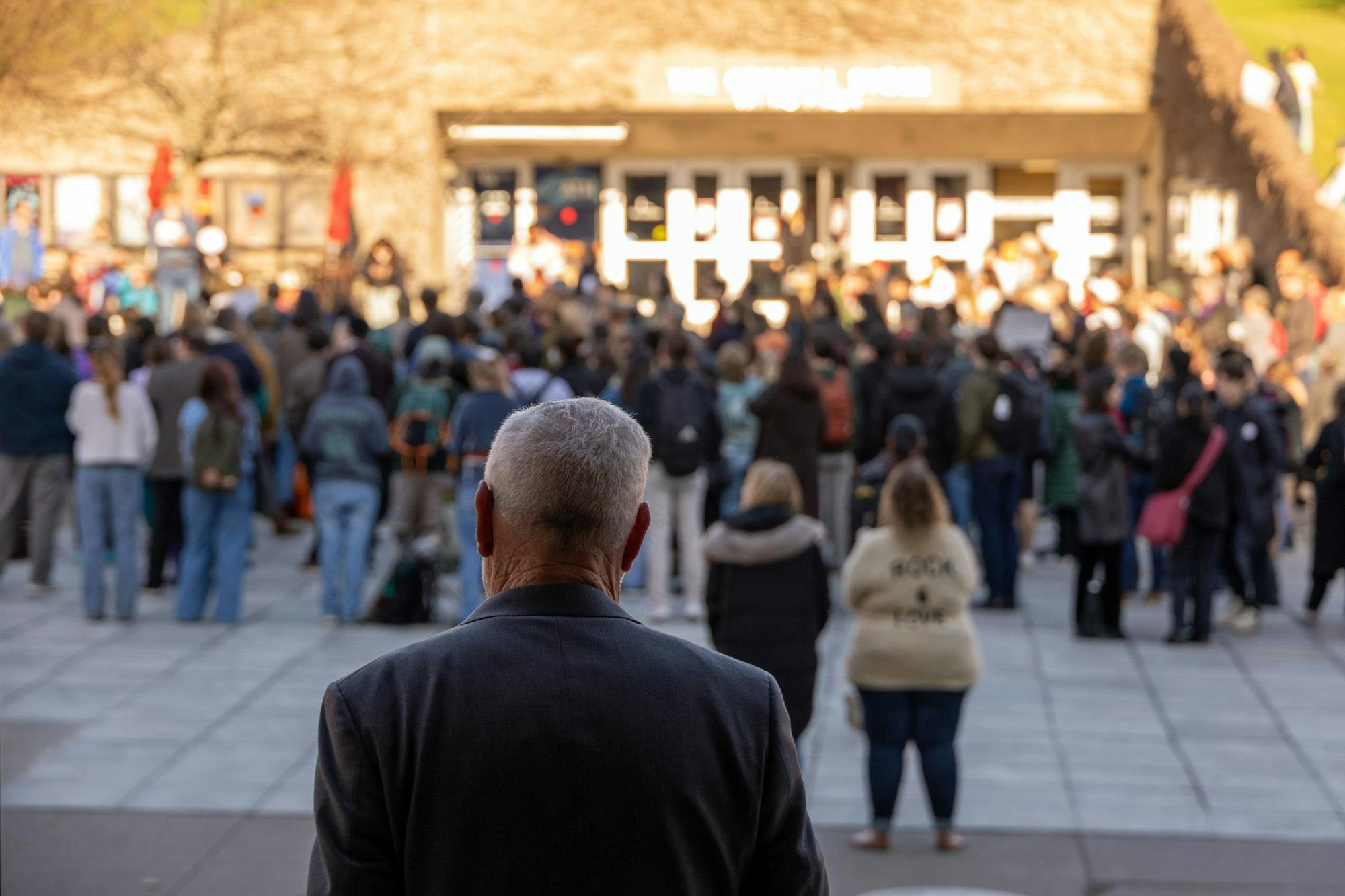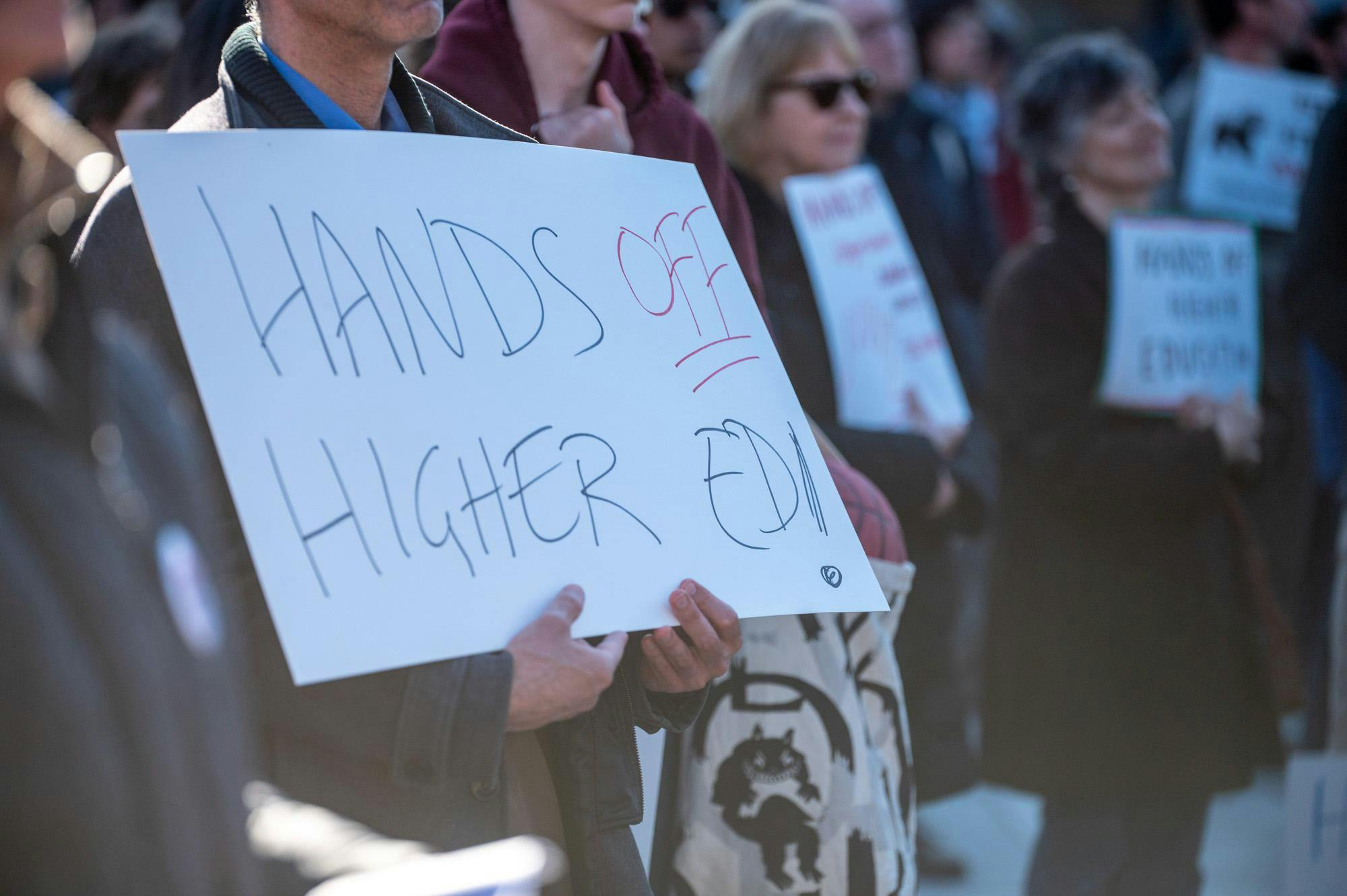Nearly 250 faculty and students gathered on Ho Plaza to protest escalating federal attacks against higher education institutions on Thursday, joining over 75 universities across the country for the National Day of Action for Higher Ed — a coordinated protest which, according to its website, aims “to renew [the] vision of higher education as an autonomous public good.”
Cornell’s rally, titled “Hands Off Higher Ed,” was organized by Cornell’s chapter of the American Association of University Professors and CU Out Loud — a new group aiming to build coalitions of support across the University in response to the Trump administration. Thursday’s event featured speeches from seven faculty members throughout the University each criticizing federal cuts to Cornell’s research funding and the threat to the integrity of academic institutions.
The demonstration comes on the heels of $1 billion in federal contracts being frozen at Cornell. According to President Michael Kotlikoff at a Thursday Student Assembly meeting, the University has still “not gotten formal notification” about the funding freeze. However, Cornell has still received at least 75 stop-work orders halting research projects across the University.
Prof. Alyssa Apsel, electrical and computer engineering, told the crowd at Thursday's rally that the department of electrical and computer engineering received several stop-work orders even though there were “no politics infused in any” of the targeted projects. Apsel described how these temporary orders will have serious long term effects.
“Our graduate programs, particularly in math and science and engineering … will not exist without federal research dollars,” Apsel said. “What this administration is doing is not just eliminating today's research, it's eliminating tomorrow's.”
Prof. David Bateman, government, is Cornell AAUP’s vice president and was an organizer of the demonstration. To create this rally, Bateman described a process of coordination that began when the national AAUP alerted chapters to hold events on the country-wide day of action.
Despite the national scale of the protests, Bateman said that awareness of the rally was spread at the community level.

President Michael Kotlikoff observes the Hands Off Higher Ed rally on Ho Plaza.
“[Organizing is] knowing people are upset about stuff, concerned about stuff, especially people who are directly impacted now … [and then] getting them to share their experiences and to talk to their colleagues,” Bateman said.
Prof. Iris Navarro-Millan, M.D., and Prof. Sarah Young, social work, who both work for the Weill Cornell School of Medicine, travelled from New York City to attend the rally. While their research was not affected by the stop work orders, they reported how others at Weill Cornell were affected.
“When we, as doctors … can no longer study the very things that are killing our patients, we watch them die,” Young said. “To watch our colleagues be so terrified that they think that if they comply [with the Trump administration], that things will get better … I'm terrified that it's coming after all of us.”
According to data published by Cornell Research Services for 2023-2024, the greatest research expenditures at the University were from Weill Cornell.
For some, such as Prof. Deborah Dinner, law, the protest was a new experience. Dinner, who joined the law school in 2021, said that she had watched protests over the last year and a half unfold on Cornell’s campus but said that Thursday’s rally was the first time she participated in an on-campus demonstration.

A demonstrator holds up a poster at the Hands Off Higher Ed rally.
“I think this [rally] is maybe unprecedented in the sense that it's bringing together a lot of different people from across the University,” Dinner said. “It feels new in that I'm defending the University.”
Many of the on-campus protests since Fall of 2023 have been pro-Palestinian demonstrations, which frequently call out the Univeristy regarding issues such as divestment and student discipline.
At one point during the rally, a few supporters tried to start chanting “Free, Free Palestine,” but the chant quickly died off.
Prof. Bruce Monger, earth and atmospheric sciences, told the crowd an anecdote about the power of demonstrating.
Over the megaphone, Monger explained that the last time spoke at an on-campus rally was in 2001 for the Kyoto Now! movement — which asked the University to adopt limits on greenhouse gas emissions decided in the 1997 Kyoto Protocol. Monger said that he was proud that after many student demonstrations on campus, administrators accepted many of the protestors’ demands.
20 years after the Kyoto Now! protest, Monger reconnected with Abigail Krich Starr ’04, a protestor he knew at the time. Monger recounted that Starr sent him an email following a webinar Monger gave on the Kyoto Now! movement. She said his talk recollecting the protest “brought tears” to her eyes.
For Monger, as he spoke at the rally, this interaction demonstrated the possibility of their protesting.
“I promise you that we're in one of these historic moments,” Monger told the crowd. “If you raise your voices, if you act now, 20 years from now, you'll get to shed those tears of joy.”
Benjamin Leynse is a member of the Class of 2027 in the College of Arts and Sciences. He is a news editor for the 143rd Editorial Board and can be reached at bleynse@cornellsun.com.











